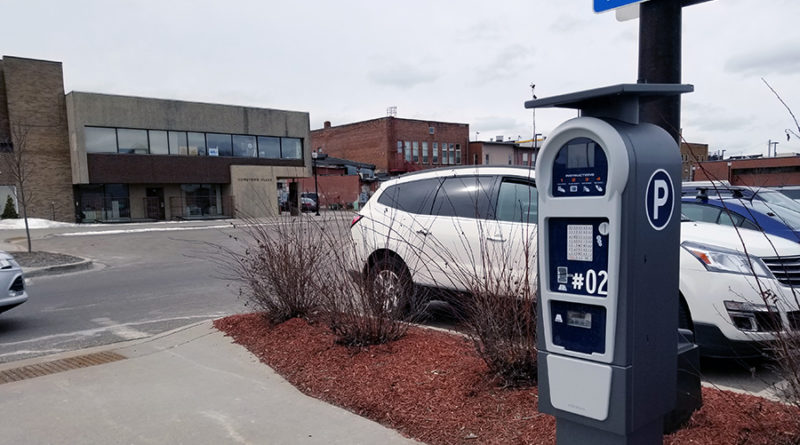City to address kiosks, paid overnight parking
By Brandi Makuski
City leaders have yet to decide how to utilize a new parking kiosk located in downtown Stevens Point but say 16 other payment stations installed across Stevens Point are working as expected.
In 2017, the city council approved the installation of parking kiosks at various locations, with an initial focus on streets surrounding the UW-Stevens Point campus; the first in several steps at a comprehensive overhaul of the city’s long-term parking plans. The city purchased 17 kiosks, installing 16 and leaving one as a spare unit, for $165,107—money borrowed on a 10-year term for capital improvements.
The kiosks were installed last fall along streets surrounding the university, in some cases replacing maintenance-heavy coin meters.
“I remember there was kind of a rush to get them in before the school year,” said Comptroller-Treasurer Corey Ladick, “because it would have been pretty disruptive to do it in the middle of the semester.”
Ladick said for each solar-powered kiosk, the city pays about $80 a month for data connectivity and credit card processing.
The city is already seeing an increase in parking revenue, Ladick said. For the first half of 2017, when the city still utilized some coin meters in the university area, it brought in about $46,319 in parking fees, but almost $35,000 of that came from kiosks.
That’s an increase from 2016, which saw only $25,806 all year from parking fees.
“It’s likely due to the convenience factor, something not offered by coin meters,” he said, adding that will help the city double its average parking revenue in the future.
“It’s probably safe to say you’re looking at $12,000, $13,000 a semester before the kiosks—now you’re looking at $30,000-something,” he said.
Ladick said between the startup fees, which includes a one-time software expense, along with monthly data costs, credit card processing fees, receipt paper and other minor expenses, it would “realistically be about five years out when we’ll start seeing a profit.”
The kiosks have also changed parking habits, according to Mayor Mike Wiza, that was expected.
“We knew it would change the way people park; we knew there would be a learning curve, but realistically, this is what most cities will look like in the future; paid on-street parking,” Wiza said.
“When you take something that was free and start charging for it, you have to look at how that changes things,” Ladick said. “When we were first having those [kiosk] discussions, you did have a lot of people parking on Maria [Drive], and up and down Illinois and Reserve and Isadore [streets]. You change the price of something, you change demand—and I think that can be hard for people to understand. But they still need to park somewhere.”
But Wiza also said there are “clearly some under-performing” kiosks that weren’t supporting their costs, which means some could be moved to new locations.
“We’re going to introduce some of the discussion to the council at the public works [meeting] next Monday,” he said. “And not just the kiosks, but downtown parking, and overnight on-street parking.”
The city is considering a new program that would allow on-street overnight parking on city streets for a fee. Users would need to buy a virtual permit each day, for a suggested fee of “two or three bucks,” Wiza said, but no decisions have been finalized.
“We’ve achieved enough of a consensus on overnight and hourly parking, where we can propose something,” he said but added no ordinances are yet being proposed.
When asked about the downtown parking kiosk, located behind Mid-State, Wiza said: “we’re still working on that.”
“We know we want that kiosk to help provide overnight parking for a fee, but how will downtown business owners and employees use it? And how will we address this with Cobblestone [Hotel]? Those are questions we’re still working to answer,” Wiza said.
The discussion returns during the May 14 board of public works meeting, scheduled for 6:20 p.m. at the Stevens Point Police Dept., 933 Michigan Ave.


